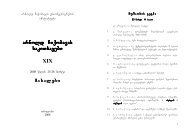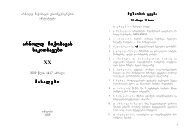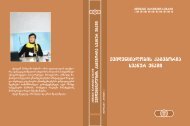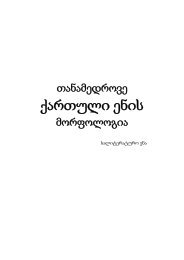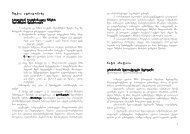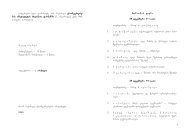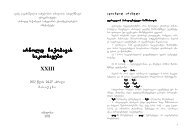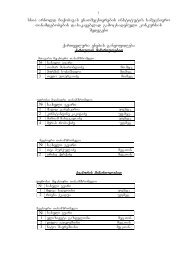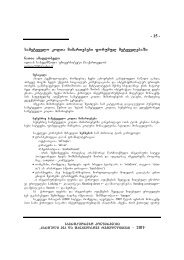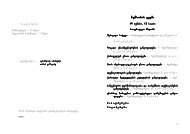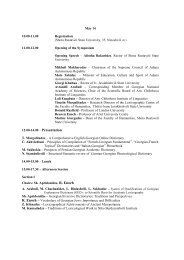5 r. a b a S i a (Tbilisi) bgeraTSesatyvisobis erTi rigisaTvis qarTvelur ...
5 r. a b a S i a (Tbilisi) bgeraTSesatyvisobis erTi rigisaTvis qarTvelur ...
5 r. a b a S i a (Tbilisi) bgeraTSesatyvisobis erTi rigisaTvis qarTvelur ...
Create successful ePaper yourself
Turn your PDF publications into a flip-book with our unique Google optimized e-Paper software.
3. Determinant is expressed by adjective, ordinal numerals, particles or<br />
pronouns, stands before the determinatum and adjunct to it.<br />
4. The adverbial modifier is expressed by an adverb and adverbial<br />
participle (gerund) adjunct to verb.<br />
In the Ossetian language an example of adjunction is considered: рёсугъд<br />
дидинёг (beautiful flower); рёсугъд дидинджытё (beautiful flowers). As a<br />
determiner here is an adjective which according to the rules of the Georgian<br />
language forms syntactical pair with determinatum and it is agreement which in<br />
Ossetian is given in a fixed form рёсугъд дидинёг (that is why it is considered<br />
the case of adjunction).<br />
In the Georgian language it is strictly determined: the adverbial modifier is<br />
under agreement, substantial is under government or government-agreement<br />
(L.Kvachadze).<br />
In the Ossetian language there is quite a different situation: some<br />
researchers consider that substantive determination at name is linked on the<br />
basis of government: Назы къохтё (fur alley); сафран фёткуытё (shaphran<br />
apples) (Grammar of the Ossetian language, v.II, edited by prof.<br />
G.S.Akhvlediani, Orjonikidze, 1969, p.80). This must be caused by the<br />
difference that in Georgian, substantial determination is under government, but<br />
during inverse order it can agreement [xeivan-ma nazvis-am; vashl-ma<br />
shapranis-ma], but in Ossetian such inversion does not take place (a determiner<br />
always anticipates the attribute) “Strict regularity is always observed in the<br />
following cases. 1. Attribute stands before determiner (V.Abaev).<br />
As to the attributive determination which in Georgian is always linked with<br />
determiner, in Ossetian it happens differently: Хорз зёрдё, хорз зёрдётё<br />
(good heart, good hearts); Дыккаг хёдзар, дыккаг хёдзары (second house, of<br />
the second house); Саст лёдзёг, саст лёдзёджы (broken (pred.det.) stick, of<br />
the broken stick; Мё чиныг, мё чиныджы; (my book, of my book) – all these<br />
and similar to them word combinations are considered as cases of adjunction<br />
(Grammar of the Ossetian language , v.II, ed., prof. Akhvlediani. Orjonikidze,<br />
1969, p.87).<br />
These attributive adjectives in Ossetian (unlike Georgian) do not decline<br />
together with the determinantum (Хорз зёрдё, хорз зёрдётё; Мё чиныг, мё<br />
чиныджы), though we think it is definitely must be the case of government<br />
when name governs name in a certain declination.<br />
83



